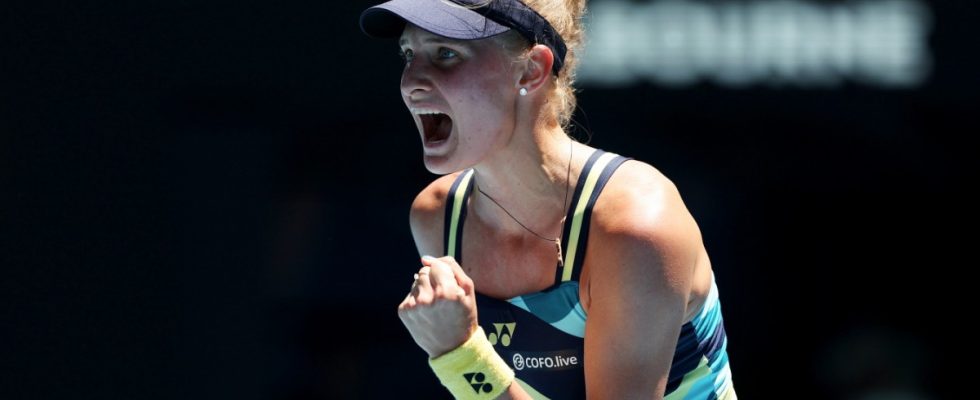Dajana Jastremska stared a little in disbelief at the bottom corner of the net where the ball had caught on the other side. Then she clasped her hands above her head. It took a moment until the bewilderment slowly gave way to a timid smile: For the first time in her career, the 23-year-old is in a Grand Slam semi-final – and she needed three more matches than the competition to do so.
Dajana Jastremska from Odessa made it into the semi-finals of the Australian Open as a qualifier. Something like this rarely happens at a Grand Slam tournament. Two and a half years ago at the US Open in New York, the British Emma Raducanu was catapulted from nowhere to galactic heights. In Melbourne, however, a comparable case occurred 46 years ago. In 1978, the Australian Christine Dorey reached the semi-finals of her home tournament; It was, the older ones will remember, the year in which Martina Navratilova won the first of her nine Wimbledon titles.
“I wasn’t even born back then,” said Jastremska, quite rightly, when she was reminded of these great deeds from a long-ago green era of lawn tennis. In 1978, the Australian Open was not played on the blue hard courts in the Olympic Park in the city center, but on grass in the southern Kooyong district.
Russia’s war of aggression on her homeland made Jastremska and her family refugees
Jastremska had eight matches in two and a half weeks behind her when she walked to the net on Wednesday afternoon to shake hands with her quarterfinal opponent Linda Noskova, the 19-year-old and highly talented Czech, after the 6:3, 6:4 victory. Three qualifying matches were necessary to even be admitted to the main round of the largest tennis tournament in the southern hemisphere. And Jastremska, who was number 21 in the world four years ago but has since slipped to position 93, had to go the full distance of three sets in each of these duels in the previous tournament.
“All the women here can play fantastic tennis,” she said, which is why she “got out of the habit of looking at the rankings.” And because she had settled in so well after qualifying, she knocked the 2022 Wimbledon winner, number three seed Kazakh Elena Rybakina, out of the tournament in her first main round match. It was the first surprise coup of this year’s Australian Open; In the round of 16, Jastremska gave former world number one Wiktoria Asarenka, 34, from Belarus no chance. “I didn’t expect that,” she said after reaching the semi-finals: She had originally wanted to use the tournament to concentrate on details in the matches, especially in the mental area.
In the quarterfinals, Dajana Jastremska (left) won against the 19-year-old Czech Linda Noskova 6:3, 6:4.
(Photo: Louise Delmotte/dpa)
There is no question that she had to overcome difficult phases, both professionally and privately. At the beginning of 2021, after she had already won three titles on the WTA tour, Jastremska was provisionally suspended by the World Tennis Association. Analysis of a doping sample from November 2020 showed traces of mesterolone, a synthetic anabolic steroid that is on the World Anti-Doping Agency (Wada) banned list. The case became known shortly before the Australian Open; Jastremska had already traveled to Melbourne.
She protested her innocence, but the Cas Sports Court rejected her appeal. But in June 2021, an investigative panel ruled that Jastremska was not guilty or negligent and consequently lifted the suspension. “I’ve had a lot of difficulties,” she said vaguely on Wednesday, “but I don’t want to talk about it now. Maybe I can explain it later, and then maybe the story will sound different.”
Jastremska says a rocket hit her grandmother’s house in early January
What is certain is that just eight months after their return to the tennis tour, Putin’s tanks rolled into Ukraine. Russia’s war of aggression on her homeland made Jastremska and her family refugees. She initially moved to Lyon alone with her sister because she was playing in a tournament there where she made it to the final – something that still surprises her today. “I hadn’t trained at all before,” she said: “There were massive attacks and we had other things to think about.” Last year her mother came to France and is now accompanying her on tours again, as she always did. The escape, she said, made the family grow closer together.
She is now the last of the three Ukrainians who made it to the round of 16 at this year’s Australian Open: Colleague Elina Switolina had to retire early due to an injury in the match against Linda Noskova, who had previously beaten world number one Iga Swiatek. Marta Kostjuk lost to US Open winner Coco Gauff. Jastrenska will now play in the semifinals against China’s Zheng Qinwen, who defeated Russia’s Anna Kalinskaja 6:7 (4), 6:3, 6:1.
A few days ago, Dayana Yastremska said that a rocket hit her grandmother’s house in Ukraine at the beginning of January. Before she left the pitch on Wednesday, she dedicated her victory, as always, to her compatriots. “I am proud of our fighters in Ukraine,” she wrote on the television camera lens. These messages are important to her, she said: “I believe that is my mission here.”

